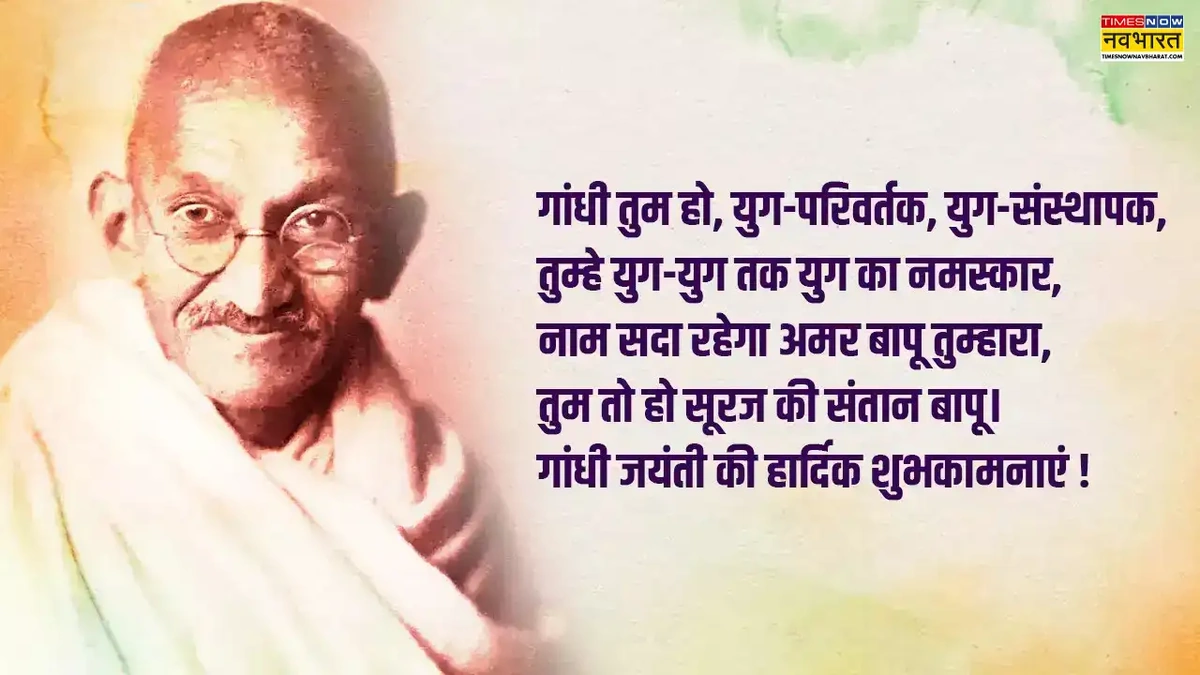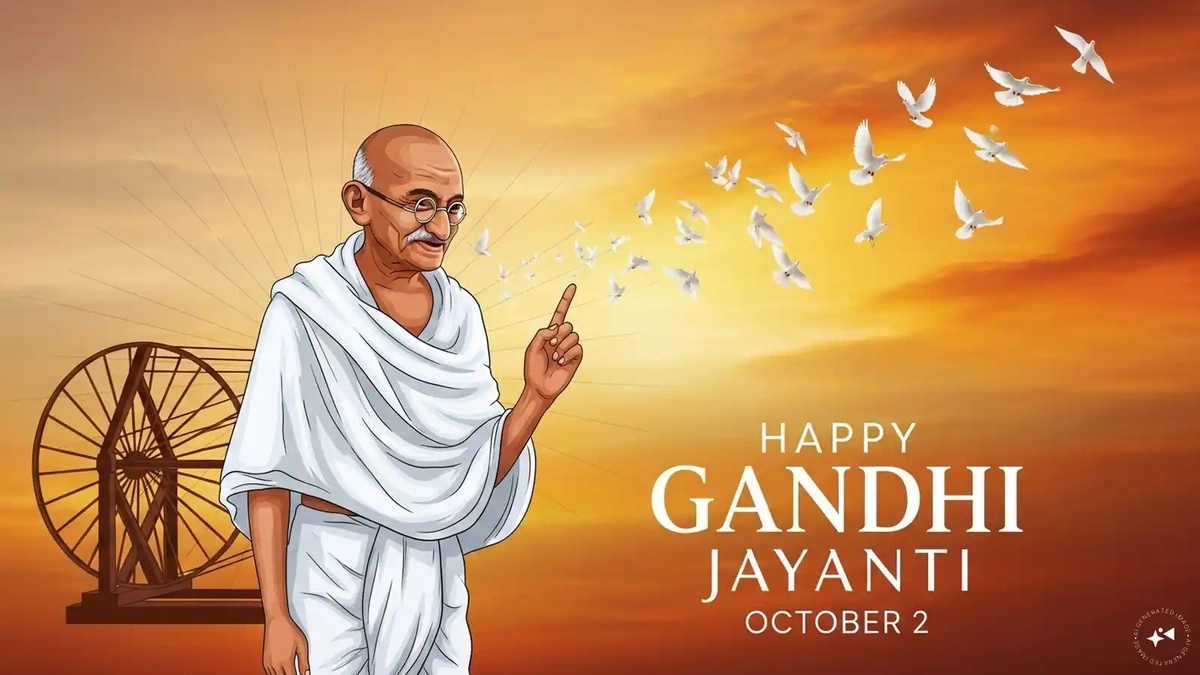Gandhi Jayanti Wishes | More Than Just a Holiday – It’s a Reflection
Gandhi Jayanti. It’s a public holiday, yes, but what fascinates me is how it’s become almost a ritual – sharing the same old quotes and images every year. But, let’s be honest, do we really think about what Gandhi stood for? Or are we just going through the motions? This year, let’s dive a little deeper and figure out what Gandhi’s message really means in today’s India. Hint: it’s way more relevant than you think. We’re not just throwing around gandhi jayanti wishes , we’re diving deep into the meaning behind them.
The Enduring Power of Gandhi’s Ideals | Why Now More Than Ever?

So, why should we even care about Gandhi in the 21st century? Isn’t he just a figure in a history book? Here’s the thing: Gandhi’s core principles – non-violence, truth, and self-sufficiency – are incredibly relevant to the challenges India faces right now. Think about it. We are living in a hyper-connected, often volatile world. His message of peace and understanding is not just some abstract ideal. It’s a practical necessity. The essence of Mahatma Gandhi’s teachings isn’t just about freedom from colonial rule, but a continued strive for inner peace, social justice, and equality.
Consider, for example, the rise of social media and the spread of misinformation. Gandhi’s emphasis on truth becomes even more crucial. We need to be critical thinkers, to question what we read and see, and to stand up for what’s right – even when it’s difficult. Or take the issue of economic inequality. Gandhi championed self-sufficiency through initiatives like the Khadi movement. This wasn’t just about making clothes; it was about empowering local communities and reducing dependence on external forces. It’s about self-reliance.
Actionable Ways to Embody Gandhian Values Today
Okay, so Gandhi’s ideals are important. But how do we actually live them in our daily lives? It’s not enough to just share a quote on social media. We need to translate these principles into action. Here’s how:
- Practice Non-Violence in Your Words: This doesn’t just mean avoiding physical fights. It means being mindful of the language we use, both online and offline. Are we contributing to a culture of negativity and hatred, or are we promoting understanding and empathy?
- Seek Truth in a World of Misinformation: Do your research. Question your assumptions. Be willing to change your mind when presented with new evidence. Fact-check everything before sharing it.
- Embrace Self-Sufficiency: Support local businesses. Learn new skills. Reduce your consumption. Grow your own food, even if it’s just a small herb garden on your balcony. Think global, act local.
Let’s be real – it’s not always easy. But even small steps can make a difference. It starts with a conscious decision to embody these values in our everyday lives. Remember, even simple Gandhi Jayanti messages should remind us of these principles.
Beyond the Charkha | Gandhi’s Relevance in Modern India
Gandhi is often associated with the spinning wheel (Charkha) and simple living. But his vision was far more expansive than that. What fascinates me is his ability to adapt timeless principles to the specific challenges of his time. He wasn’t afraid to challenge the status quo, to experiment with new ideas, and to learn from his mistakes. That’s a quality we desperately need today. It calls for serious introspection and active implementation of his core values. It goes far beyond superficial Gandhi Jayanti celebrations .
India today faces complex challenges – from climate change to social inequality to political polarization. Gandhi’s approach offers a valuable framework for addressing these issues. His emphasis on dialogue, consensus-building, and peaceful resistance can help us navigate these turbulent times. We should not forget the importance of philanthropic efforts in India to achieve inclusive growth and development.
Reinterpreting Gandhi for a New Generation
How do we make Gandhi relevant to young people today? Let’s face it – a black and white photo of a man in a loincloth doesn’t exactly scream “cool” to Gen Z. The key is to show them how his principles can be applied to the issues they care about – climate change, social justice, and mental health.
For example, Gandhi’s emphasis on sustainability aligns perfectly with the environmental concerns of young people. His message of non-violence resonates with those who are fighting against social injustice and inequality. And his focus on inner peace and self-reflection can be a valuable tool for managing stress and anxiety in a fast-paced world. Let’s promote Gandhi Jayanti awareness among the younger generation by showcasing the importance of his vision.
Ultimately, celebrating Gandhi Jayanti is not just about remembering the past. It’s about embracing the future – a future where truth, non-violence, and self-sufficiency are not just ideals, but guiding principles for a more just and sustainable world. It’s more than just forwarding happy Gandhi Jayanti quotes .
FAQ | Decoding Gandhi Jayanti
What is the significance of Gandhi Jayanti?
It commemorates Mahatma Gandhi’s birthday (October 2nd) and celebrates his life and principles.
How is Gandhi Jayanti celebrated in India?
Through prayer services, tributes, cultural events, and the promotion of Gandhian values.
What are some of Gandhi’s core teachings?
Non-violence, truth, self-sufficiency, and social justice are the core of Gandhiji’s philosophy .
How can I celebrate Gandhi Jayanti meaningfully?
By reflecting on Gandhi’s teachings and striving to embody them in your daily life. Consider volunteering or contributing to a cause that embodies his values. The emphasis should always be on remembering Mahatma Gandhi .
Are there any specific events associated with Gandhi Jayanti?
Yes, various commemorative events are organised across the country, including visits to Raj Ghat in Delhi.
What is the importance of non-violence in Gandhi’s philosophy?
Gandhi believed that non-violence was the most powerful force for social change, advocating for peaceful resistance against injustice.
Gandhi’s message of self-reliance remains relevant even today, emphasizing the importance of local production. Remember, the true meaning of Gandhi Jayanti’s importance lies in following his teachings.
So, this Gandhi Jayanti, let’s not just send a WhatsApp forward and call it a day. Let’s actually try to live a little more like Gandhi. And watch how the world around us starts to change. It is important to check the information aboutR Power share pricebefore making any investment decision.













